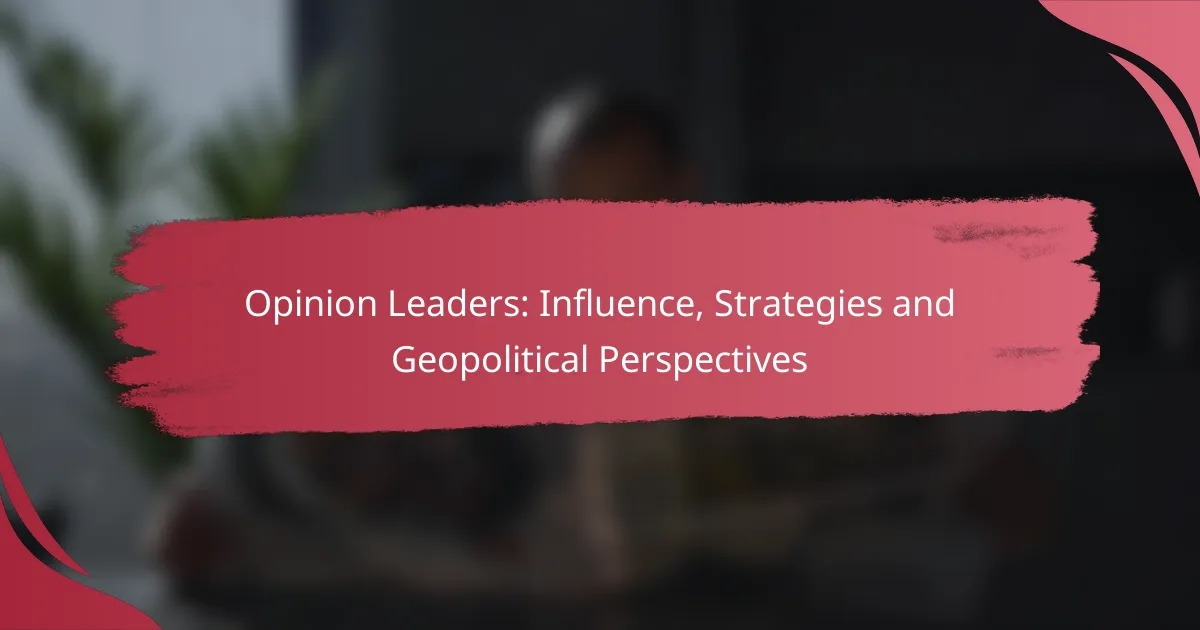Nationalism plays a crucial role in shaping public sentiment and geopolitical views by instilling a strong sense of identity and belonging among citizens. This powerful sentiment can lead to both unity and division, influencing social dynamics and political landscapes while prioritizing national interests in international relations. Understanding and addressing nationalism is essential for fostering inclusivity and constructive dialogue in political discourse.

How Does Nationalism Affect Public Sentiment in the United States?
Nationalism significantly shapes public sentiment in the United States by fostering a strong sense of identity and belonging among citizens. This sentiment can lead to both positive and negative outcomes, influencing social dynamics and political landscapes.
Increased polarization
Nationalism often leads to increased polarization within the United States, as individuals align more closely with their national identity over other affiliations. This can create divisions between groups, particularly in political contexts, where differing views on national interests can escalate tensions.
For example, during election cycles, nationalist rhetoric may intensify partisan divides, making compromise more challenging. As citizens rally around nationalistic ideals, they may become less tolerant of opposing viewpoints, further entrenching divisions.
Rise in national pride
The rise of nationalism can foster a renewed sense of national pride among Americans, encouraging citizens to celebrate their country’s achievements and values. This pride can manifest in various ways, including increased participation in national holidays and support for local businesses.
However, while national pride can unify citizens, it can also lead to exclusionary attitudes towards those perceived as outsiders. This duality means that while some may feel empowered, others may feel marginalized based on their backgrounds or beliefs.
Impact on voting behavior
Nationalism can significantly influence voting behavior in the United States, often swaying voters towards candidates who emphasize strong nationalistic policies. Voters may prioritize issues such as immigration control, national security, and economic protectionism, reflecting their nationalistic sentiments.
In recent elections, candidates who have successfully tapped into nationalist themes have seen substantial support, particularly among demographics that feel economically or socially threatened. This trend suggests that nationalism will continue to play a crucial role in shaping electoral outcomes and party platforms in the future.

What Role Does Nationalism Play in Geopolitical Views?
Nationalism significantly shapes geopolitical views by fostering a sense of identity and prioritizing national interests over global cooperation. This mindset influences how countries engage with one another, affecting foreign policy, alliances, and trade agreements.
Influence on foreign policy
Nationalism drives countries to adopt foreign policies that prioritize their own interests, often at the expense of international collaboration. For instance, a nation may choose to withdraw from multilateral agreements if they perceive these as undermining their sovereignty or economic interests.
Leaders may leverage nationalist sentiments to rally public support for aggressive foreign policies, which can lead to increased military spending or interventionist strategies. This can create tensions with other nations and complicate diplomatic relations.
Shifts in alliances
Nationalism can lead to realignments in international alliances as countries seek partners that share similar nationalistic goals. For example, nations may distance themselves from traditional allies if they feel those relationships do not serve their national interests.
As a result, new coalitions may form based on shared nationalist ideologies, potentially leading to a more fragmented global landscape. Countries may prioritize bilateral agreements over multilateral ones, reflecting a shift towards more self-interested diplomacy.
Impact on trade agreements
Nationalist policies often influence trade agreements by emphasizing protectionism and domestic industries. Countries may impose tariffs or trade barriers to protect local businesses, which can disrupt established trade relationships and lead to retaliatory measures.
In recent years, several nations have renegotiated trade deals to better reflect national interests, prioritizing local job creation over global economic integration. This can result in less favorable terms for consumers and businesses reliant on international markets.

How Can Nationalism Be Addressed in Political Discourse?
Addressing nationalism in political discourse involves fostering understanding and inclusivity while promoting constructive conversations. By emphasizing shared values and common goals, political leaders can mitigate divisive sentiments and encourage a more cohesive society.
Promoting inclusive narratives
Inclusive narratives are essential for countering the often exclusive nature of nationalism. Political discourse should focus on shared identities and collective aspirations that transcend ethnic or national boundaries. For example, highlighting common challenges such as climate change or economic inequality can unite diverse groups under a common cause.
To effectively promote inclusive narratives, leaders should utilize various platforms, including social media and community forums, to engage a broad audience. This approach can help to dismantle stereotypes and foster a sense of belonging among all citizens, regardless of their background.
Encouraging dialogue
Encouraging open dialogue is crucial for addressing nationalism in political discussions. Creating safe spaces for conversations allows individuals to express their views while also listening to others. This two-way communication can help bridge divides and reduce misunderstandings that often fuel nationalistic sentiments.
Practical steps to encourage dialogue include hosting town hall meetings, facilitating workshops, and utilizing online discussion platforms. These initiatives should aim to include voices from various demographics, ensuring that all perspectives are represented and valued. By fostering respectful exchanges, communities can work towards a more unified approach to national identity.

What Are the Historical Contexts of Nationalism in Europe?
Nationalism in Europe has evolved through various historical contexts, significantly shaping national identities and political landscapes. From the rise of nation-states in the 19th century to the complexities of post-war Europe, nationalism has influenced public sentiment and geopolitical views across the continent.
Post-World War II developments
After World War II, nationalism in Europe underwent a transformation as countries sought to rebuild and redefine their identities. The devastation of the war led to a wave of decolonization, where many nations in Africa and Asia gained independence, often inspired by nationalist movements. In Europe, this period saw a push for unity, exemplified by the formation of organizations aimed at fostering cooperation and preventing future conflicts.
However, nationalist sentiments persisted, particularly in regions with strong ethnic identities. The Balkans, for instance, experienced intense nationalist conflicts in the 1990s, leading to the breakup of Yugoslavia and significant geopolitical tensions. These developments highlighted the dual nature of nationalism as both a unifying and divisive force.
Impact of the European Union
The European Union (EU) has played a crucial role in shaping nationalism in Europe by promoting economic integration and political cooperation among member states. While the EU aims to transcend national borders, it has also sparked debates about national sovereignty and identity. Some citizens view the EU as a threat to their national culture and autonomy, leading to a resurgence of nationalist movements in various countries.
For example, the rise of populist parties in countries like France and Hungary has been fueled by anti-EU sentiment, advocating for the prioritization of national interests over collective European policies. This tension between nationalism and supranationalism continues to influence public sentiment and political discourse across Europe.

How Does Nationalism Influence Social Movements?
Nationalism significantly shapes social movements by fostering a sense of identity and belonging among individuals, often leading to collective action. This influence can manifest in various ways, from grassroots initiatives to changes in public policy, particularly regarding immigration.
Grassroots activism
Grassroots activism is often fueled by nationalist sentiments, as individuals rally around shared cultural or national identities. These movements typically emerge from local communities and can address a range of issues, including social justice, environmental concerns, and economic inequality.
For example, in many countries, nationalist groups have organized protests and campaigns to advocate for local businesses, emphasizing the importance of supporting homegrown industries. This type of activism can mobilize significant public support and influence local and national policies.
Impact on immigration policies
Nationalism can lead to stricter immigration policies as citizens express concerns about cultural preservation and economic competition. Countries experiencing a rise in nationalist sentiment often see calls for tighter border controls and more rigorous vetting processes for immigrants.
For instance, in several European nations, nationalist movements have successfully pushed for policies that limit immigration from non-EU countries, reflecting a desire to maintain cultural homogeneity. This can result in significant changes to immigration laws and the overall approach to foreign nationals seeking residency or asylum.

What Are the Psychological Effects of Nationalism on Citizens?
The psychological effects of nationalism on citizens can be profound, influencing their identity, values, and perceptions of others. Nationalism often fosters a strong sense of pride and belonging, but it can also lead to exclusionary attitudes towards those perceived as outsiders.
Sense of belonging
A sense of belonging is a fundamental psychological effect of nationalism, as it creates a strong connection between individuals and their nation. This connection can enhance self-esteem and foster community ties, making individuals feel part of something larger than themselves.
Nationalism can manifest in various ways, such as participation in national celebrations, support for local traditions, or engagement in civic activities. These expressions reinforce social cohesion and shared identity, which can be particularly strong in countries with rich cultural histories.
However, it’s essential to balance this sense of belonging with inclusivity. While nationalism can unite people, it may also lead to exclusion of minority groups or those with differing views. Encouraging dialogue and understanding can help mitigate these divisive tendencies, promoting a more harmonious society.



